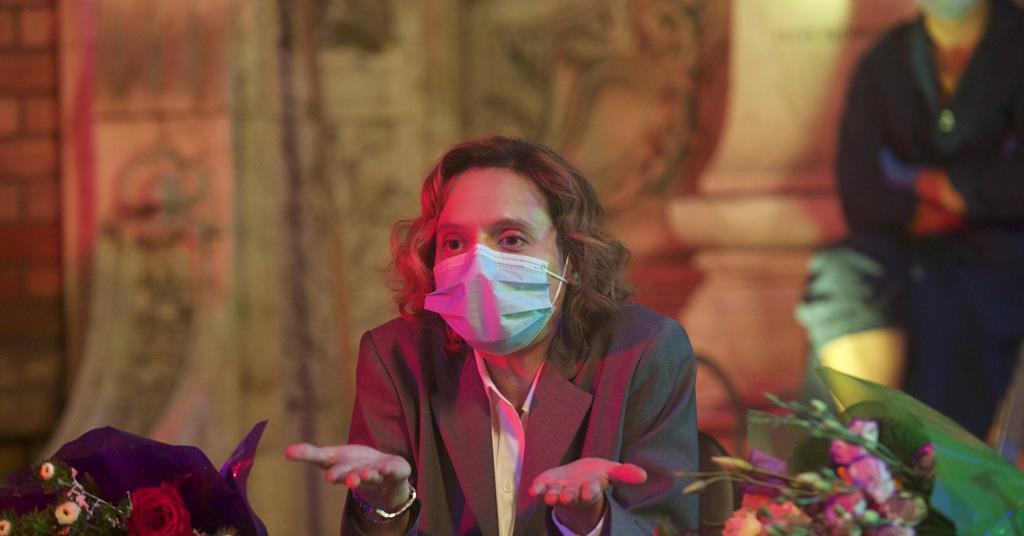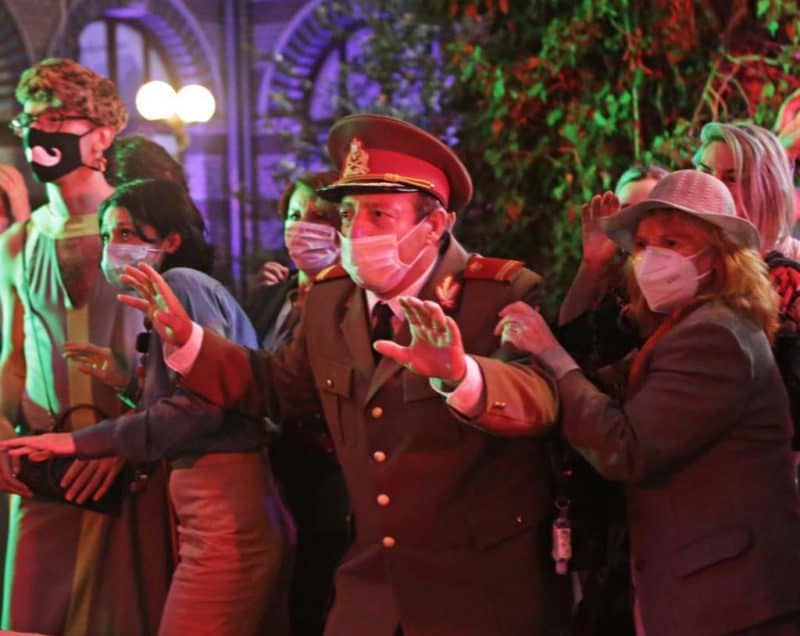Radu Jude has been a frequent guest at the Berlinale. In 2015, he received a Silver Bear for Aferim! In the 2021 virtual Berlinale competition, he won the Golden Bear for Bad Luck Banging or Loony Porn (Babardeala cu bucluc sau porno balamuc). The film was shot last year during the pandemic, so most characters wear masks. That starts already with the very first shot, but then it’s not one of the protective ones. We see a sex tape with teacher Emilia “Emi” (Katia Pascariu) engaging in sex with her husband Eugen, holding the camera. Unbeknownst to her, he posts the video online, and all hell seems to break loose.
The sex tape is a kind of prologue. The rest of the film is divided into three parts. The first shows Emi doing errands in Bucharest. The final one is a parents’ meeting she is forced to attend, where her future fate will be decided. Sandwiched between the two is a section of montage which purports to give a portrait of Romania, yesterday, today and tomorrow if there is such a thing. The depiction of Romania is hardly flattering. During the first segment, we follow Emi walking around, visibly worried that anyone will recognize her. The most striking aspect about this part is that everyone acts horrendously. People are rude, aggressive and loutish. The sole exception seems to be Emi.

The section is composed of quite unappealing shots with seemingly random pannings from one side to the other. It might be an attempt to create a documentary feel, or it might merely be sloppy filmmaking necessitated by the pandemic. In any case, it looks terrible. A feeling that is amplified when you watch it on a big screen. Since Berlinale was virtual this year, critics watched it at home on their TVs, laptops or smartwatches. As opposed to Natural Light, it works in the film’s favour. The smaller the screen, the less egregious the look of the film will appear. The style of the film literally mirrors the oafish behaviour of the people we are supposed to scorn.
The second part aims to be a montage akin to someone like Makavejev. It goes through historical moments of the state and the church and seemingly wants to say how awful and hypocritical they have been through the ages. Once again a very simplistic segment that spells things out without any nuances whatsoever. There is no food for thought here, nor any intellectual montage. Only simple lessons rammed down our throats. If anyone is surprised and shocked to learn that the church and the state have committed horrible and cowardly acts, this segment might be illuminating, but for grown-ups, it won’t be.

The third act of Bad Luck Banging
Then we come to the third act, which is an expression I usually avoid, but in an obvious triptych, it makes sense: The meeting with parents where it will be decided if Emi will keep her position or not. It starts surprisingly with one of the mothers insisting that they all watch the full video. Even though it’s not online anymore, she downloaded it for some reason. As blatantly unnecessary as this seems, how essential was it to show 3 minutes of said video to the audience in the film’s very first scene? The content was immediately evident, so is the director any better than the mob he portrays?
The worst parents in the world
There doesn’t seem to be a single decent person among the parents. We witness misogyny, overt racism and hypocritical moralizing. Those few who seem to defend Emi do it for their own gain. So is there no decent person in the film that is not a part of this dysfunctional and sick society? Yes, there is; Emi herself. Throughout the film, she doesn’t seem to put one foot wrong, and during the gathering, she constantly puts the parents in their place. It’s like she is a saint from another world, as holy as the nun Pascariu portrayed in Beyond the Hills (2012). It’s as subtle as an old western in black & white. Or, maybe she is a superheroine?
The spectator is invited to regard the people with the same condescension as the mob does with Emi. Radu Jude has made a film where the audience invariably feels superior to everyone we see, except the almost supernaturally intellectual and sensitive Emi. For the second year in a row, the Golden Bear has been awarded to a film that tells us precisely what to think at any given moment. In combination with the artless cinematography and a sense of humour on the level of the Carry on series, the final result is ugly and mind-numbing. The film doesn’t depict a crass reality as much as it is a product of it.

